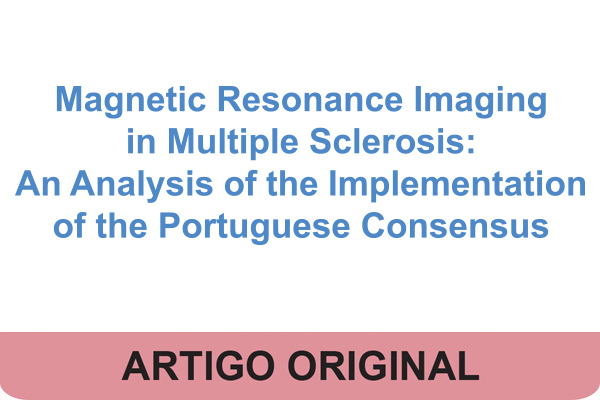SOCIAL MEDIA
Portuguese Medical Association's Scientific Journal

Introduction: Magnetic resonance imaging (MRI) plays a critical role in diagnosing and monitoring people with multiple sclerosis (MS). The 2020 Portuguese Consensus on Magnetic Resonance Imaging in Multiple Sclerosis aimed to standardize MRI use. This study evaluated the implementation of the consensus in clinical practice.
Methods: This is an observational, retrospective, longitudinal and multicentric study comprising patients diagnosed with MS between 2019 and 2022 from seven hospital centers in Portugal. We collected demographic data and details regarding MRI requests, protocols, and reports. We performed descriptive and comparative analyses between the period before and after guideline publication.
Results: We included 242 patients, mainly female (66.0%), with a mean age of 37 (SD 13). A total of 989 MRIs were performed, 69.1% follow-ups, 68.1% brain MRIs, and 31.9% spinal cord MRIs. Around half of the MRI requests fulfilled all the recommended information. All mandatory sequences in the neuroimaging protocol were performed in 82.5% of brain MRIs and 71.1% of spinal cord MRIs. None of the reports fulfilled all the suggested parameters. Magnetic resonance imaging technical description and imaging findings had the least compliance, mainly concerning gadolinium information (0.85%), lesion load (18.6%), and atrophy characterization (27.1%). After the implementation of the consensus, physicians reported the MS phenotype more often (p < 0.05) and neuroradiologists reported more technical parameters (p < 0.05). When MRIs were performed in a private setting, neuroimaging protocols were similar, but the reports fulfilled more frequently the suggested topics regarding the conclusion (p < 0.05).
Conclusion: This study suggests incomplete adherence to the Portuguese Consensus on MRI in MS. Information provided by the physician in MRI requests was often insufficient, which could hamper MRI protocol planning. Magnetic resonance imaging reports were frequently lacking relevant information for the diagnosis and follow-up of MS patients. Further efforts are needed to ensure full implementation and optimize MS care.
Keywords: Consensus; Magnetic Resonance Imaging; Multiple Sclerosis/diagnostic imaging; Portugal